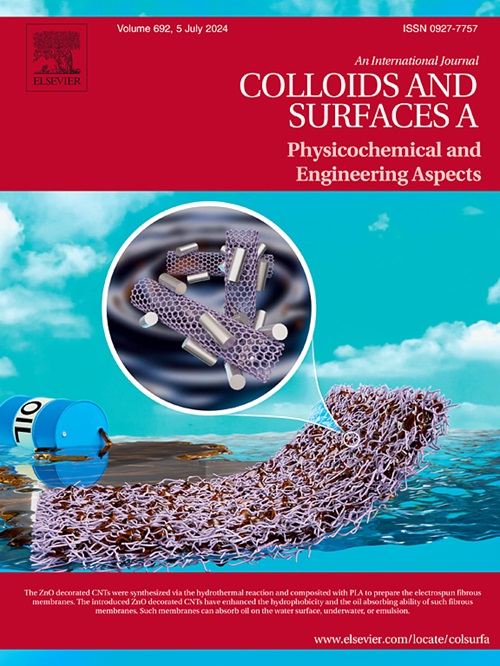Microencapsulated alkaline protease with enhanced stability and temperature resistance for silk degumming
IF 4.9
2区 化学
Q2 CHEMISTRY, PHYSICAL
Colloids and Surfaces A: Physicochemical and Engineering Aspects
Pub Date : 2024-12-03
DOI:10.1016/j.colsurfa.2024.135894
引用次数: 0
Abstract
Alkaline protease plays a critical role in enhancing protein digestion and absorption but is sensitive to environmental factors, particularly pH value and temperature. Only under appropriate conditions, alkaline protease can catalyze the cleavage of amide bonds in macromolecular proteins. To enhance the stability and temperature resistance of alkaline protease (AP), microencapsulation using ethyl cellulose (EC) was employed. EC, known for its biocompatibility and biodegradability, was used as the wall material in an oil phase separation method, with dichloromethane serving as low boiling point solvent. The microencapsulated alkaline protease (Mic-AP) was characterized using scanning electron microscopy (SEM), Fourier transform infrared spectroscopy (FT-IR) and thermogravimetric analysis (TGA). The enzyme activity was evaluated using casein as the substrate. It was found that optimal conditions for Mic-AP preparation were mcore:mwall of 1:1, emulsifier of 5 wt%, and volatilization temperature of 40 °C, yielding up to 90 % microencapsulation efficiency, the enzyme activity up to 17,000 U/g. Microencapsulation of alkaline protease not only enhances its stability but also preserves its natural properties. It is proved that Mic-AP exhibits improved temperature resistance. Furthermore, the enzyme activity of Mic-AP is higher than that of AP at high temperature of 60 °C, 80 °C, 100 °C and 120 °C. Therefore, Mic-AP has significant potential for high-temperature applications, such as the feed industry and silk degumming.
求助全文
约1分钟内获得全文
求助全文
来源期刊
CiteScore
8.70
自引率
9.60%
发文量
2421
审稿时长
56 days
期刊介绍:
Colloids and Surfaces A: Physicochemical and Engineering Aspects is an international journal devoted to the science underlying applications of colloids and interfacial phenomena.
The journal aims at publishing high quality research papers featuring new materials or new insights into the role of colloid and interface science in (for example) food, energy, minerals processing, pharmaceuticals or the environment.

 求助内容:
求助内容: 应助结果提醒方式:
应助结果提醒方式:


